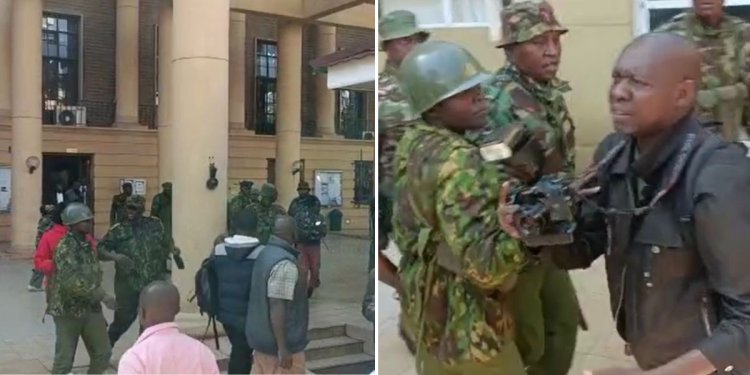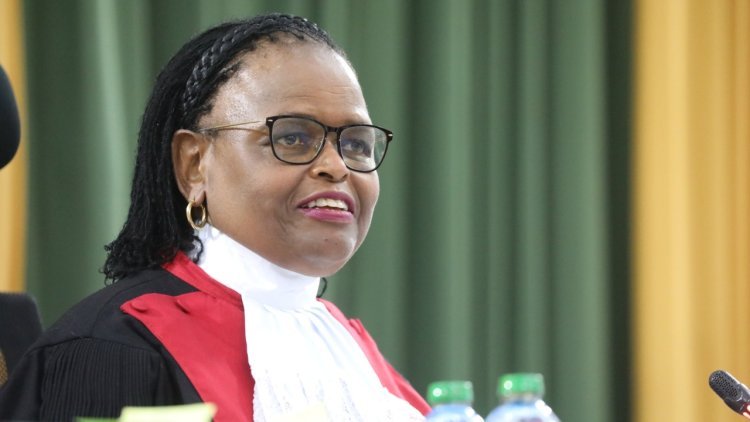Judiciary Speaks On Police Assaulting Journalists Covering Babu Owino Ruling
According to the Judiciary, freedom of the media is secured under Article 34 of the Constitution of Kenya 2010.

The Judiciary on Friday, July 21 criticised the National Police Service (NPS) following commotion at the Milimani Law Courts which saw a section of journalists covering the arraignment of Embakasi East Member of Parliament (MP) Babu Owino roughed up by police officers.
In a statement from its Directorate of Public Affairs and Communications, the Chief Justice Martha Koome-led arm of government affirmed that journalists drawn from media houses across the country were not barred from covering cases, particularly those considered of huge interest to members of the public.
The Judiciary added that the presence of the media was a means of keeping the arm of the government accountable to Kenyans through members of the Fourth Estate playing their watchdog role.

CJ Martha Koome during Supreme Court proceedings on the 2022 presidential election petition. /FILE
"The attention of the Judiciary has been drawn to a video clip circulating in sections of media, showing uniformed police officers harassing journalists who were covering a story at the Milimani Law Courts. The Judiciary espouses the principles of transparency, civic participation and accountability.
"Unless otherwise directed, the Judiciary does not bar the media from covering cases within its precincts. The Judiciary believes that media presence in court denotes permanent civic vigilance over the exercise of judicial authority, which is delegated to the Judiciary by the Kenyan people," read the statement in part.
According to the Judiciary, freedom of the media is secured under Article 34 of the Constitution of Kenya 2010.
"We condemn in the strongest terms any harassment of the media in their line of duty, anywhere and particularly within court precincts.
"We expect all persons, especially our justice sector partners, to exhibit the highest standards of conduct in our courtrooms and within court precincts. The conduct of all justice actors must at all times promote and uphold the rule of law and build public confidence in the justice system," added the statement.
The Judiciary further reaffirmed its commitment to upholding media freedom, the rights of journalists and the rule of law.
The video seen by Viral Tea had shown the journalists trying to film the post-proceeding events when the police prevented them from recording interviews.
The police reportedly told the journalists that they were not allowed to continue staying within the precincts of the court since the proceedings had been concluded.
The journalists however argued that they had a right to film the proceedings, but the police refused to listen.
Amidst a heavy presence of police officers in jungle-green uniforms and some with anti-riot gear, one of them was captured pushing a photojournalist on the staircase after trying to reason with him.
Speaking to Nation after the incident, the photojournalist, Collins Kweyu, who works at The Standard, confessed that he was manhandled by the anti-riot police, who continued to push him even after he identified himself as a journalist.
"Yes. They pushed me. My left knee was injured and I'm still in pain. I identified myself as a journalist but they were not willing to listen to me," said Kweyu.
The Media Council of Kenya (MCK) was yet to issue a statement on the matter by the time of publishing this article.
Here is the video:
Toka hapa, media gani?- A police officer is heard telling a journalist as police rough up journalists covering Babu Owino’s bail ruling at Milimani Law Courts#ViralVideos pic.twitter.com/CElfwe7lKM — Viral Tea Ke (@ViralTeaKe) July 21, 2023

 admin
admin 




